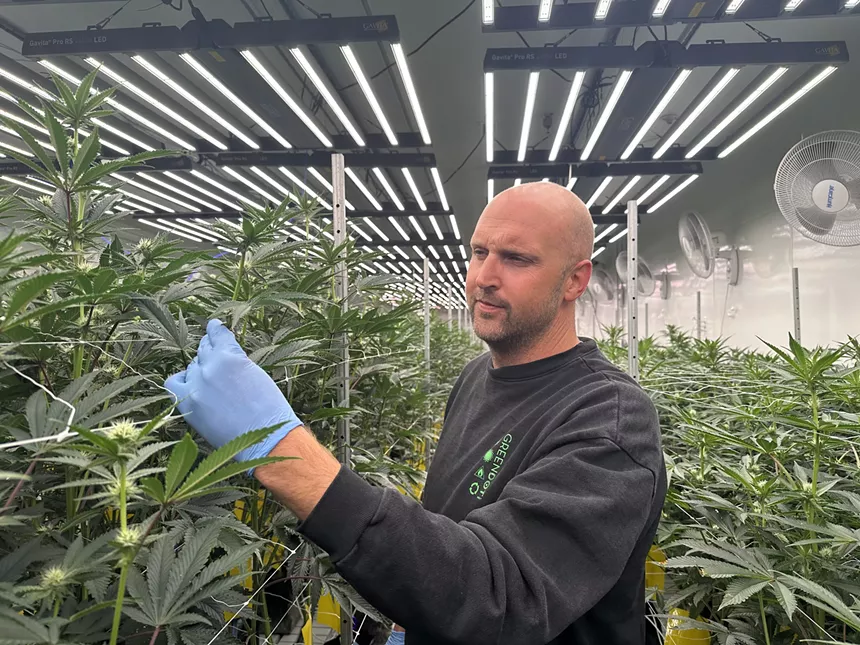Green Light: Five People to Watch in Colorado Cannabis in 2025
January 4, 2025
Cannabis has become ingrained in culture and commerce in Colorado, where the plant was legalized for recreational purposes over twelve years ago. And even though people across the country aren’t chasing that Rocky Mountain high like they once did, we still have some of the smartest minds and greenest thumbs in legal weed.
After busy and successful rides in 2024 that led to even bigger plans for this year, here are five people to watch in Colorado cannabis in 2025:
Green Dot Labswill celebrate a decade in legal cannabis this year, and co-founders Alana and Dave Malone already have a laundry list of awards and benchmarks to be proud of — but they won’t stay high on their success for very long.
The couple behind Boulder’s longtime grow and hash lab face a challenging landscape in Denver, where dispensary sales continue falling and few cannabis brands stay on top. They’ll be doubling up on those challenges in 2025, too, with a brand-new facility in Phoenix on the way as Green Dot enters Arizona’s up-and-down marijuana market this spring.
But the Malones and their expanding crew have proven time and again that Green Dot is willing to look past yellow lights in the market. They’ve already cornered Colorado’s after a fast and unlikely rise from eating peanut butter and jelly sandwiches for dinner to selling their product in hundreds of dispensaries across the state. Now they’re in business with a New York investment firm, putting down a $25 million bet that Dave’s eye for genetics and Alana’s business instincts will carry Green Dot into a newer, bigger era.
“We started this on the back of my parents’ willingness to take a very serious risk,” says Alana, the CEO of Green Dot.
“But I think, more than anything, people like authenticity. And our approach is letting Dave go somewhere new and driving it forward.”
A former engineer, Dave moved to Boulder from Louisiana to grow medical marijuana. In 2009 he met Alana, who was days away from jetting out of the country on a business education program. Before leaving, she went to visit a friend who happened to live next to Dave, but the friend wasn’t home. When Alana entered the shared backyard, she ran into Dave’s dog, who bit her in the butt. Two years later, Dave and Alana had their first child. In 2015, Green Dot was born thanks to a starting investment from Alana’s parents.

Dave Malone’s talent for finding great genetics and getting the best out of them has pushed Green Dot to the top of Colorado’s cultivation scene.
Thomas Mitchell
Green Dot began as an extraction company and found success in hash oil and live resin, but it soon began tinkering with solventless rosin and flower drops, as well. Now the brand is a heavyweight in both classes, but the flower lineup is what draws the most customers, according to the Malones.
“It’s all about the genetics and stories we can tell with strains,” Dave says. “And it all starts in the garden: infrastructure, genetics, and knowing how to measure your plants.”
If Green Dot can re-create its Rocky Mountain magic in the desert, Arizonans will be treated to an otherworldly combo of cannabis genetics, flavor and mind-melting potency. In-house creations like A5 Wagyu, Paloma, ROYGBIV and Thunderdome have received numerous awards and accolades from our cannabis critics, and Green Dot’s rosin and hydrocarbon extractions, the original production arm of the company, rank among the top in a very competitive hash scene in Colorado.
But expanding into new states and territories while keeping up with weed snobs and business partners has been difficult for other popular cannabis brands. Cookies, the most recognizable name in American retail cannabis, has been part of lawsuits and seen surprise store closures since franchising across the country, while the quality of flower under the Cookies brand varies heavily from state to state. 710 Labs, a flower and extraction brand based in California, has found more critical success with a slower rollout across the country, but has also experienced bumps in the road, with a mold recall hitting a 710 grow in 2023.
Green Dot, which operates two facilities in Colorado, has already moved a handful of top employees to Arizona to ensure a smooth launch at the $25 million facility, according to Dave; they hope to have product available in that state’s dispensaries by April. The Malones also plan to launch a line of rosin edibles in Colorado this year, and will begin winding down Green Dot’s Silver Label, which partners with third-party growers to make cannabis extracts.
There are “always a few burnt pancakes when you try something new,” Dave admits, but the Malones are confident that 2025 will be a huge year for Green Dot. As our national profile fades among cannabis users, the results of Green Dot’s play could say a lot about Colorado, too.

Tetra Lounge owner Dewayne Benjamin (left) welcomed Method Man to Tetra Lounge in August.
Julian Donaldson
We’ve been keeping an eye on Dewayne Benjamin since hefounded Tetra cannabis lounge six years ago, but 2025 will be the first year that he and Tetra are fully licensed and free to operate without government interference. In 2018, Benjamin founded the RiNo venue as a private, members-only cannabis lounge, a business practice that has been regularly called out by city licensing officials and law enforcement since the plant was legalized. He kept operating in the face of occasional fines and shutdowns, however, and applied for a local cannabis hospitality license in 2021. Despite being approved for one by the state in 2022,Tetra wasn’t given the green light to open by the city until last May. Now Tetra is one of just two licensed cannabis venues in Denver, and the only one allowing patrons to smoke. Benjamin hosts cannabis-friendly comedy, food and yoga events as well as concerts, company parties and more at Tetra, with the likes of Aaron Gordon andMethod Man stopping by in 2024. We can’t wait to see what he does this year when he doesn’t have to look over his shoulder.The legal cannabis industry is now eleven years old andhauls in well over $1 billion each year in Colorado. Joining it in 2025 will be thecommercial psilocybin space, which is now open for applications as prospective mushroom growers, testing labs and therapeutic trip facilitators try to obtain licenses. As the executive director of both the Colorado Marijuana Enforcement Division and the state’s new Natural Medicine Division, Dominique Mendiola will have plenty of plants (and spores) on her plate in 2025. Both industries are new to the public and layered with intrigue, taboo and uncharted territory. As a leader of both enforcement arms and their annual rulemaking efforts, Mendiola will have a rippling impact in Colorado and beyond as more states consider legalizing cannabis or certain psychedelics.

Meraki co-founders Phil Halpern (middle) and Matt DenBleyker (right).
Thomas Mitchell
Colorado’s recreational cannabis space is barely over a decade old and has already hit a midlife crisis. Dispensary sales and weed tourism are fading, and the state’s hold on national cannabis culture is largely dead. If we’re ever going to get back near the top of that pot pyramid, we’re going to need people like Phil Halpern. The longtime grower and co-founder of Meraki cannabis, Halpern has shown thatclassic strains like Sour Diesel still bring in customers, and he took advantage of that success this year by pumping out such popular modern delicacies as Fatty Cakes,Nightshifter and Rozay Rain. Meraki expanded further under its concentrate label, Glacier Extracts, in 2024, and has plans to push a new fresh-frozen extraction arm, Big Grams, this year. Halpern is also cooking up a merger with a well-known rosin brand that could add new genetics to Meraki’s strain library in 2025.
Search
RECENT PRESS RELEASES
Related Post




